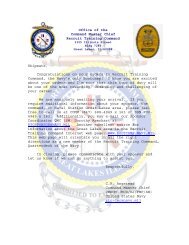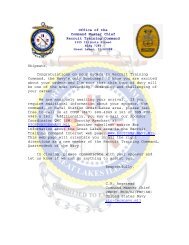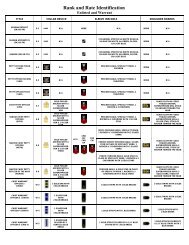- Page 1 and 2:
Tr Tr vice aining Ser Ser Naval Com
- Page 3 and 4:
TRAINEE GUIDE FOR BASIC MILITARY TR
- Page 5 and 6:
TRAINEE GUIDE A-950-0001 TABLE OF C
- Page 7 and 8:
TRAINEE GUIDE A-950-0001 SECURITY A
- Page 9 and 10:
TRAINEE GUIDE A-950-0001 HOW TO USE
- Page 11 and 12:
TRAINEE GUIDE A-950-0001 RECRUIT TR
- Page 13 and 14:
TRAINEE GUIDE A-950-0001 RECRUIT TR
- Page 15 and 16:
TRAINEE GUIDE A-950-0001 A. Introdu
- Page 17 and 18:
TRAINEE GUIDE A-950-0001 OUTLINE SH
- Page 19 and 20:
TRAINEE GUIDE A-950-0001 OUTLINE SH
- Page 21 and 22:
TRAINEE GUIDE A-950-0001 OUTLINE SH
- Page 23 and 24:
TRAINEE GUIDE A-950-0001 OUTLINE SH
- Page 25 and 26:
TRAINEE GUIDE A-950-0001 Sheet 1 of
- Page 27 and 28:
TRAINEE GUIDE A-950-0001 NOTES MONT
- Page 29 and 30:
TRAINEE GUIDE A-950-0001 OUTLINE SH
- Page 31 and 32:
TRAINEE GUIDE A-950-0001 OUTLINE SH
- Page 33 and 34:
TRAINEE GUIDE A-950-0001 OUTLINE SH
- Page 35 and 36:
TRAINEE GUIDE A-950-0001 OUTLINE SH
- Page 37 and 38:
TRAINEE GUIDE A-950-0001 OUTLINE SH
- Page 39 and 40:
TRAINEE GUIDE A-950-0001 OUTLINE SH
- Page 41 and 42:
TRAINEE GUIDE A-950-0001 OUTLINE SH
- Page 43 and 44:
TRAINEE GUIDE A-950-0001 OUTLINE SH
- Page 45 and 46:
TRAINEE GUIDE A-950-0001 OUTLINE SH
- Page 47 and 48:
TRAINEE GUIDE A-950-0001 OUTLINE SH
- Page 49 and 50:
TRAINEE GUIDE A-950-0001 d. Homosex
- Page 51 and 52:
TRAINEE GUIDE A-950-0001 ASSIGNMENT
- Page 53 and 54:
TRAINEE GUIDE A-950-0001 INFORMATIO
- Page 55 and 56:
TRAINEE GUIDE A-950-0001 INFORMATIO
- Page 57 and 58:
TRAINEE GUIDE A-950-0001 INFORMATIO
- Page 59 and 60:
TRAINEE GUIDE A-950-0001 INFORMATIO
- Page 61 and 62:
TRAINEE GUIDE A-950-0001 INFORMATIO
- Page 63 and 64:
TRAINEE GUIDE A-950-0001 INFORMATIO
- Page 65 and 66:
TRAINEE GUIDE A-950-0001 A. Introdu
- Page 67 and 68:
TRAINEE GUIDE A-950-0001 OUTLINE SH
- Page 69 and 70:
TRAINEE GUIDE A-950-0001 OUTLINE SH
- Page 71 and 72:
TRAINEE GUIDE A-950-0001 OUTLINE SH
- Page 73 and 74:
TRAINEE GUIDE A-950-0001 NOTES WATC
- Page 75 and 76:
TRAINEE GUIDE A-950-0001 A. Study A
- Page 77 and 78:
TRAINEE GUIDE A-950-0001 32. What a
- Page 79 and 80:
TRAINEE GUIDE A-950-0001 JOB SHEET
- Page 81 and 82:
TRAINEE GUIDE A-950-0001 OUTLINE SH
- Page 83 and 84:
TRAINEE GUIDE A-950-0001 OUTLINE SH
- Page 85 and 86:
TRAINEE GUIDE A-950-0001 NOTES SURV
- Page 87 and 88:
TRAINEE GUIDE A-950-0001 A. Introdu
- Page 89 and 90:
TRAINEE GUIDE A-950-0001 OUTLINE SH
- Page 91 and 92:
TRAINEE GUIDE A-950-0001 OUTLINE SH
- Page 93 and 94:
TRAINEE GUIDE A-950-0001 OUTLINE SH
- Page 95 and 96:
TRAINEE GUIDE A-950-0001 OUTLINE SH
- Page 97 and 98:
TRAINEE GUIDE A-950-0001 (2) Sympto
- Page 99 and 100:
TRAINEE GUIDE A-950-0001 OUTLINE SH
- Page 101 and 102:
TRAINEE GUIDE A-950-0001 OUTLINE SH
- Page 103 and 104:
TRAINEE GUIDE A-950-0001 A. Study A
- Page 105 and 106:
TRAINEE GUIDE A-950-0001 ASSIGNMENT
- Page 107 and 108:
TRAINEE GUIDE A-950-0001 OUTLINE SH
- Page 109 and 110:
TRAINEE GUIDE A-950-0001 OUTLINE SH
- Page 111 and 112:
TRAINEE GUIDE A-950-0001 12. Helico
- Page 113 and 114:
TRAINEE GUIDE A-950-0001 A. Study A
- Page 115 and 116:
TRAINEE GUIDE A-950-0001 A. Introdu
- Page 117 and 118:
TRAINEE GUIDE A-950-0001 OUTLINE SH
- Page 119 and 120:
TRAINEE GUIDE A-950-0001 OUTLINE SH
- Page 121 and 122:
TRAINEE GUIDE A-950-0001 OUTLINE SH
- Page 123 and 124:
TRAINEE GUIDE A-950-0001 A. Study A
- Page 125 and 126:
TRAINEE GUIDE A-950-0001 A. Introdu
- Page 127 and 128:
TRAINEE GUIDE A-950-0001 OUTLINE SH
- Page 129 and 130:
TRAINEE GUIDE A-950-0001 OUTLINE SH
- Page 131 and 132:
TRAINEE GUIDE A-950-0001 NOTES NAVY
- Page 133 and 134:
TRAINEE GUIDE A-950-0001 DIAGRAM SH
- Page 135 and 136:
TRAINEE GUIDE A-950-0001 Lieutenant
- Page 137 and 138:
TRAINEE GUIDE A-950-0001 DIAGRAM SH
- Page 139 and 140:
TRAINEE GUIDE A-950-0001 A. Introdu
- Page 141 and 142:
TRAINEE GUIDE A-950-0001 OUTLINE SH
- Page 143 and 144:
TRAINEE GUIDE A-950-0001 OUTLINE SH
- Page 145 and 146:
TRAINEE GUIDE A-950-0001 OUTLINE SH
- Page 147 and 148:
TRAINEE GUIDE A-950-0001 OUTLINE SH
- Page 149 and 150:
TRAINEE GUIDE A-950-0001 OUTLINE SH
- Page 151 and 152:
TRAINEE GUIDE A-950-0001 OUTLINE SH
- Page 153 and 154:
TRAINEE GUIDE A-950-0001 A. Study A
- Page 155 and 156:
TRAINEE GUIDE A-950-0001 ASSIGNMENT
- Page 157 and 158:
TRAINEE GUIDE A-950-0001 OUTLINE SH
- Page 159 and 160:
TRAINEE GUIDE A-950-0001 OUTLINE SH
- Page 161 and 162:
TRAINEE GUIDE A-950-0001 (4) Earrin
- Page 163 and 164:
TRAINEE GUIDE A-950-0001 OUTLINE SH
- Page 165 and 166:
TRAINEE GUIDE A-950-0001 OUTLINE SH
- Page 167 and 168:
TRAINEE GUIDE A-950-0001 OUTLINE SH
- Page 169 and 170:
TRAINEE GUIDE A-950-0001 NOTES UNIF
- Page 171 and 172:
TRAINEE GUIDE A-950-0001 A. Introdu
- Page 173 and 174:
TRAINEE GUIDE A-950-0001 OUTLINE SH
- Page 175 and 176:
TRAINEE GUIDE A-950-0001 d. Video O
- Page 177 and 178:
TRAINEE GUIDE A-950-0001 NOTES COND
- Page 179 and 180:
TRAINEE GUIDE A-950-0001 A. Introdu
- Page 181 and 182:
TRAINEE GUIDE A-950-0001 OUTLINE SH
- Page 183 and 184:
TRAINEE GUIDE A-950-0001 OUTLINE SH
- Page 185 and 186:
TRAINEE GUIDE A-950-0001 OUTLINE SH
- Page 187 and 188:
TRAINEE GUIDE A-950-0001 OUTLINE SH
- Page 189 and 190:
TRAINEE GUIDE A-950-0001 NOTES MILI
- Page 191 and 192:
TRAINEE GUIDE A-950-0001 ASSIGNMENT
- Page 193 and 194:
TRAINEE GUIDE A-950-0001 2. Equal O
- Page 195 and 196:
TRAINEE GUIDE A-950-0001 OUTLINE SH
- Page 197 and 198:
TRAINEE GUIDE A-950-0001 OUTLINE SH
- Page 199 and 200:
TRAINEE GUIDE A-950-0001 OUTLINE SH
- Page 201 and 202:
TRAINEE GUIDE A-950-0001 OUTLINE SH
- Page 203 and 204:
TRAINEE GUIDE A-950-0001 d. Fratern
- Page 205 and 206:
TRAINEE GUIDE A-950-0001 A. Study A
- Page 207 and 208:
TRAINEE GUIDE A-950-0001 ASSIGNMENT
- Page 209 and 210:
TRAINEE GUIDE A-950-0001 A. Introdu
- Page 211 and 212:
TRAINEE GUIDE A-950-0001 (2) SAFETY
- Page 213 and 214:
TRAINEE GUIDE A-950-0001 OUTLINE SH
- Page 215 and 216:
TRAINEE GUIDE A-950-0001 NOTES BASI
- Page 217 and 218:
TRAINEE GUIDE A-950-0001 ASSIGNMENT
- Page 219 and 220:
TRAINEE GUIDE A-950-0001 OUTLINE SH
- Page 221 and 222:
TRAINEE GUIDE A-950-0001 OUTLINE SH
- Page 223 and 224:
TRAINEE GUIDE A-950-0001 OUTLINE SH
- Page 225 and 226:
TRAINEE GUIDE A-950-0001 OUTLINE SH
- Page 227 and 228:
TRAINEE GUIDE A-950-0001 NOTES BASI
- Page 229 and 230:
TRAINEE GUIDE A-950-0001 A. Study A
- Page 231 and 232:
TRAINEE GUIDE A-950-0001 INFORMATIO
- Page 233 and 234:
TRAINEE GUIDE A-950-0001 OUTLINE SH
- Page 235 and 236:
TRAINEE GUIDE A-950-0001 7. Line Ha
- Page 237 and 238:
TRAINEE GUIDE A-950-0001 OUTLINE SH
- Page 239 and 240:
TRAINEE GUIDE A-950-0001 NOTES LINE
- Page 241 and 242:
TRAINEE GUIDE A-950-0001 A. Introdu
- Page 243 and 244:
TRAINEE GUIDE A-950-0001 JOB SHEET
- Page 245 and 246:
TRAINEE GUIDE A-950-0001 A. Introdu
- Page 247 and 248:
TRAINEE GUIDE A-950-0001 OUTLINE SH
- Page 249 and 250:
TRAINEE GUIDE A-950-0001 OUTLINE SH
- Page 251 and 252:
TRAINEE GUIDE A-950-0001 OUTLINE SH
- Page 253 and 254:
TRAINEE GUIDE A-950-0001 NOTES MARL
- Page 255 and 256:
TRAINEE GUIDE A-950-0001 A. Introdu
- Page 257 and 258:
TRAINEE GUIDE A-950-0001 OUTLINE SH
- Page 259 and 260:
TRAINEE GUIDE A-950-0001 OUTLINE SH
- Page 261 and 262:
TRAINEE GUIDE A-950-0001 OUTLINE SH
- Page 263 and 264:
TRAINEE GUIDE A-950-0001 NOTES FAMI
- Page 265 and 266:
TRAINEE GUIDE A-950-0001 ASSIGNMENT
- Page 267 and 268:
TRAINEE GUIDE A-950-0001 A. Introdu
- Page 269 and 270:
TRAINEE GUIDE A-950-0001 OUTLINE SH
- Page 271 and 272:
TRAINEE GUIDE A-950-0001 OUTLINE SH
- Page 273 and 274:
TRAINEE GUIDE A-950-0001 OUTLINE SH
- Page 275 and 276:
TRAINEE GUIDE A-950-0001 OUTLINE SH
- Page 277 and 278:
TRAINEE GUIDE A-950-0001 OUTLINE SH
- Page 279 and 280:
TRAINEE GUIDE A-950-0001 OUTLINE SH
- Page 281 and 282:
TRAINEE GUIDE A-950-0001 OUTLINE SH
- Page 283 and 284:
TRAINEE GUIDE A-950-0001 A. Study A
- Page 285 and 286:
TRAINEE GUIDE A-950-0001 OUTLINE SH
- Page 287 and 288:
TRAINEE GUIDE A-950-0001 OUTLINE SH
- Page 289 and 290:
TRAINEE GUIDE A-950-0001 b. Standin
- Page 291 and 292:
TRAINEE GUIDE A-950-0001 OUTLINE SH
- Page 293 and 294:
TRAINEE GUIDE A-950-0001 c. Trigger
- Page 295 and 296:
TRAINEE GUIDE A-950-0001 OUTLINE SH
- Page 297 and 298:
TRAINEE GUIDE A-950-0001 A. Introdu
- Page 299 and 300: TRAINEE GUIDE A-950-0001 OUTLINE SH
- Page 301 and 302: TRAINEE GUIDE A-950-0001 OUTLINE SH
- Page 303 and 304: TRAINEE GUIDE A-950-0001 OUTLINE SH
- Page 305 and 306: TRAINEE GUIDE A-950-0001 OUTLINE SH
- Page 307 and 308: TRAINEE GUIDE A-950-0001 NOTES SMAL
- Page 309 and 310: TRAINEE GUIDE A-950-0001 A. Introdu
- Page 311 and 312: TRAINEE GUIDE A-950-0001 OUTLINE SH
- Page 313 and 314: TRAINEE GUIDE A-950-0001 OUTLINE SH
- Page 315 and 316: TRAINEE GUIDE A-950-0001 A. Introdu
- Page 317 and 318: TRAINEE GUIDE A-950-0001 (2) Legal
- Page 319 and 320: TRAINEE GUIDE A-950-0001 OUTLINE SH
- Page 321 and 322: TRAINEE GUIDE A-950-0001 OUTLINE SH
- Page 323 and 324: TRAINEE GUIDE A-950-0001 A. Study A
- Page 325 and 326: TRAINEE GUIDE A-950-0001 INFORMATIO
- Page 327 and 328: TRAINEE GUIDE A-950-0001 INFORMATIO
- Page 329 and 330: TRAINEE GUIDE A-950-0001 h. Special
- Page 331 and 332: TRAINEE GUIDE A-950-0001 INFORMATIO
- Page 333 and 334: TRAINEE GUIDE A-950-0001 INFORMATIO
- Page 335 and 336: TRAINEE GUIDE A-950-0001 INFORMATIO
- Page 337 and 338: TRAINEE GUIDE A-950-0001 INFORMATIO
- Page 339 and 340: TRAINEE GUIDE A-950-0001 INFORMATIO
- Page 341 and 342: TRAINEE GUIDE A-950-0001 GENERAL SE
- Page 343 and 344: TRAINEE GUIDE A-950-0001 Suspicious
- Page 345 and 346: TRAINEE GUIDE A-950-0001 INFORMATIO
- Page 347 and 348: TRAINEE GUIDE A-950-0001 INFORMATIO
- Page 349: TRAINEE GUIDE A-950-0001 During Res
- Page 353 and 354: TRAINEE GUIDE A-950-0001 INFORMATIO
- Page 355 and 356: TRAINEE GUIDE A-950-0001 A. Study A
- Page 357 and 358: TRAINEE GUIDE A-950-0001 A. Introdu
- Page 359 and 360: TRAINEE GUIDE A-950-0001 OUTLINE SH
- Page 361 and 362: TRAINEE GUIDE A-950-0001 OUTLINE SH
- Page 363 and 364: TRAINEE GUIDE A-950-0001 (3) Dog Ze
- Page 365 and 366: TRAINEE GUIDE A-950-0001 OUTLINE SH
- Page 367 and 368: TRAINEE GUIDE A-950-0001 NOTES BASI
- Page 369 and 370: TRAINEE GUIDE A-950-0001 ASSIGNMENT
- Page 371 and 372: TRAINEE GUIDE A-950-0001 A. Introdu
- Page 373 and 374: TRAINEE GUIDE A-950-0001 OUTLINE SH
- Page 375 and 376: TRAINEE GUIDE A-950-0001 A. Study A
- Page 377 and 378: TRAINEE GUIDE A-950-0001 OUTLINE SH
- Page 379 and 380: TRAINEE GUIDE A-950-0001 OUTLINE SH
- Page 381 and 382: TRAINEE GUIDE A-950-0001 OUTLINE SH
- Page 383 and 384: TRAINEE GUIDE A-950-0001 DIAGRAM SH
- Page 385 and 386: TRAINEE GUIDE A-950-0001 A. Introdu
- Page 387 and 388: TRAINEE GUIDE A-950-0001 c. Class b
- Page 389 and 390: TRAINEE GUIDE A-950-0001 OUTLINE SH
- Page 391 and 392: TRAINEE GUIDE A-950-0001 NOTES CHEM
- Page 393 and 394: TRAINEE GUIDE A-950-0001 A. Introdu
- Page 395 and 396: TRAINEE GUIDE A-950-0001 OUTLINE SH
- Page 397 and 398: TRAINEE GUIDE A-950-0001 A. Study A
- Page 399 and 400: TRAINEE GUIDE A-950-0001 OUTLINE SH
- Page 401 and 402:
TRAINEE GUIDE A-950-0001 OUTLINE SH
- Page 403 and 404:
TRAINEE GUIDE A-950-0001 OUTLINE SH
- Page 405 and 406:
TRAINEE GUIDE A-950-0001 OUTLINE SH
- Page 407 and 408:
TRAINEE GUIDE A-950-0001 NOTES PORT
- Page 409 and 410:
TRAINEE GUIDE A-950-0001 DIAGRAM SH
- Page 411 and 412:
TRAINEE GUIDE A-950-0001 ASSIGNMENT
- Page 413 and 414:
TRAINEE GUIDE A-950-0001 OUTLINE SH
- Page 415 and 416:
TRAINEE GUIDE A-950-0001 OUTLINE SH
- Page 417 and 418:
TRAINEE GUIDE A-950-0001 ASSIGNMENT
- Page 419 and 420:
TRAINEE GUIDE A-950-0001 OUTLINE SH
- Page 421 and 422:
TRAINEE GUIDE A-950-0001 OUTLINE SH
- Page 423 and 424:
TRAINEE GUIDE A-950-0001 (1) Electr
- Page 425 and 426:
TRAINEE GUIDE A-950-0001 OUTLINE SH
- Page 427 and 428:
TRAINEE GUIDE A-950-0001 OUTLINE SH
- Page 429 and 430:
TRAINEE GUIDE A-950-0001 NOTES GENE
- Page 431 and 432:
TRAINEE GUIDE A-950-0001 A. Introdu
- Page 433 and 434:
TRAINEE GUIDE A-950-0001 NOTES FIRE
- Page 435 and 436:
TRAINEE GUIDE A-950-0001 A. Introdu
- Page 437 and 438:
TRAINEE GUIDE A-950-0001 OUTLINE SH
- Page 439 and 440:
TRAINEE GUIDE A-950-0001 NOTES COND
- Page 441 and 442:
TRAINEE GUIDE A-950-0001 ASSIGNMENT
- Page 443 and 444:
TRAINEE GUIDE A-950-0001 OUTLINE SH
- Page 445 and 446:
TRAINEE GUIDE A-950-0001 OUTLINE SH
- Page 447 and 448:
TRAINEE GUIDE A-950-0001 OUTLINE SH
- Page 449 and 450:
TRAINEE GUIDE A-950-0001 OUTLINE SH
- Page 451 and 452:
TRAINEE GUIDE A-950-0001 A. Introdu
- Page 453 and 454:
TRAINEE GUIDE A-950-0001 d. Off-dut
- Page 455 and 456:
TRAINEE GUIDE A-950-0001 OUTLINE SH
- Page 457 and 458:
TRAINEE GUIDE A-950-0001 OUTLINE SH
- Page 459 and 460:
TRAINEE GUIDE A-950-0001 OUTLINE SH
- Page 461 and 462:
TRAINEE GUIDE A-950-0001 NOTES CARE
- Page 463 and 464:
TRAINEE GUIDE A-950-0001 ASSIGNMENT
- Page 465 and 466:
TRAINEE GUIDE A-950-0001 MASTER CHI
- Page 467 and 468:
TRAINEE GUIDE A-950-0001 NAVAL DENT
- Page 469 and 470:
TRAINEE GUIDE A-950-0001 NAVAL MEDI
- Page 471 and 472:
TRAINEE GUIDE A-950-0001 black bean
- Page 473 and 474:
TRAINEE GUIDE A-950-0001 ham lamb p
- Page 475 and 476:
TRAINEE GUIDE A-950-0001 INDEX Topi
- Page 477 and 478:
475
- Page 479:
Shipboard Force Protection Conditio






